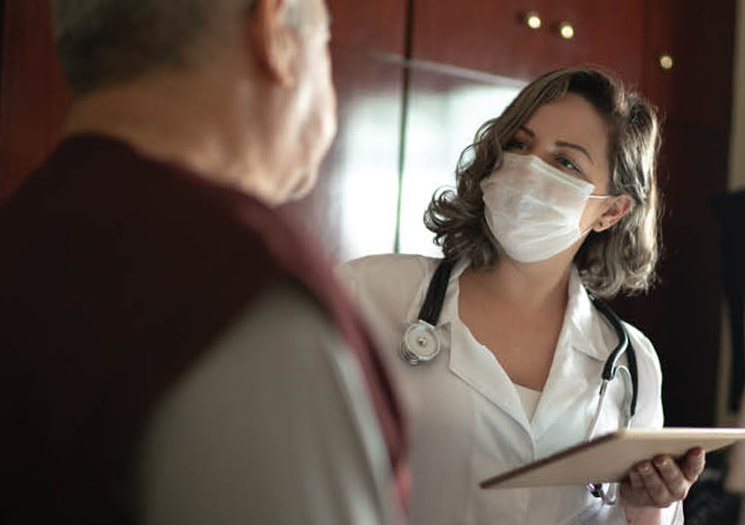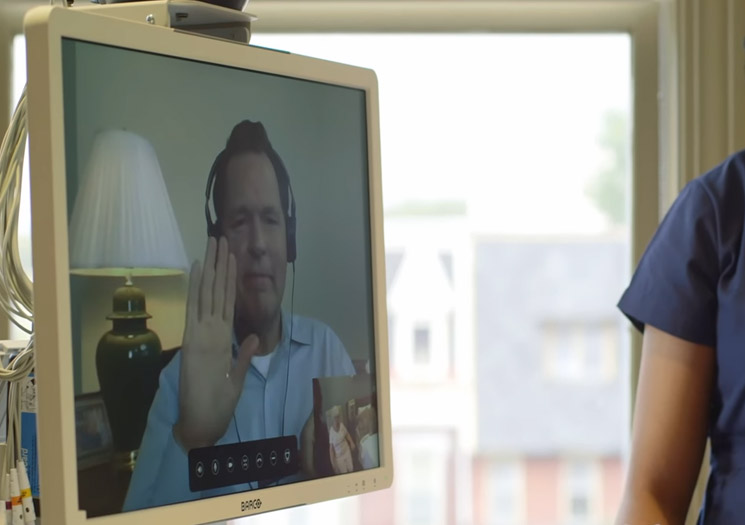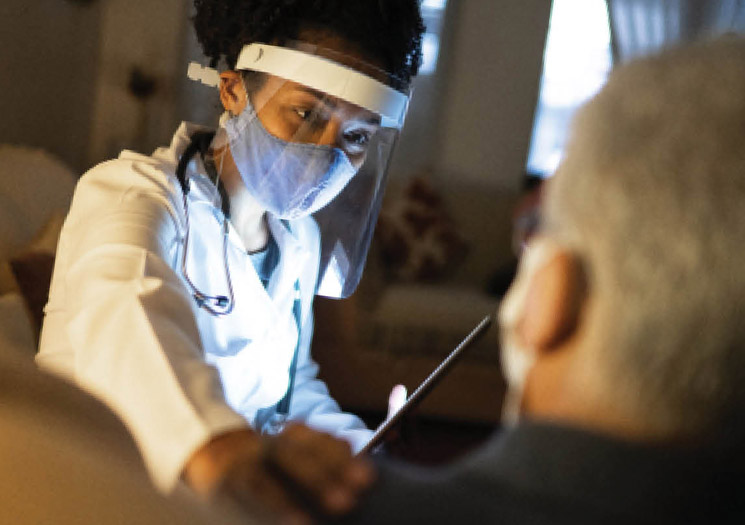- Find a Provider
-
Services
-
Redeemer Health provides compassionate care across every stage of life.
- View all Services
-
- Patients & Visitors
- Locations
- Careers
categories:

The health status of John* was becoming dire before Holy Redeemer’s Home Care team entered his life. He needed gastric bypass surgery to help control his extreme weight, but severe shortness of breath resulting from heart failure and asthma weakened his ability to withstand surgery. Surgery was impractical, said his doctors, until he could begin to improve his health.
Isolated by the pandemic, miles away from any family, and struggling to access critical medications due to lack of funding, John felt helpless. Then hope was renewed when a team from Holy Redeemer Home Care-Union County arrived to nurture and support John’s health. The compassionate and talented team, which provided care to John for almost two months, included two telehealth nurses, an RN case manager, a home health aide, a physical therapist, and a social worker.
At the start of John’s home care journey, the team found him morbidly obese and out-of-breath after walking any more than 20 feet. To compound the situation, the medicines and healthy foods that could help to improve his breathing and heart were out of reach because he lacked insurance and funds.“With a plethora of psychosocial challenges and the majority of his family living out of state, he had little support or resources,” says Carleen Valerio, RN, a lead telehealth nurse on John’s Home Care team.
After a careful assessment of John’s circumstances, Rachel Villavicencio, a Home Care social worker, was able to procure prescription coverage that would allow John to rely on consistent access to vital medications. She also was able to provide him with access to healthy food through a nearby food pantry.
Simultaneous to Rachel’s efforts a Home Care physical therapist helped John gain greater endurance, strength, and balance. Additionally, a home health aide on the Home Care team visited John three days each week to help him with personal care, and Home Care RNs Carleen Valerio and Grace Virata, along with Home Care LPN Cindy Pryszlak, kept a close watch on John’s blood pressure, heart rate, weight, and oxygen level through a telemonitoring system.
With patience, purpose, and dedication, the team cared for, inspired, and strengthened John as he worked toward his health care goals. At the end of two months, he experienced a measurable turnaround, losing almost 30 pounds and walking more than 150 feet without becoming breathless. Additionally, he grew motivated to continue to exercise and eager to comply with his medication regimen.
“Now John’s doctor is hopeful that he will be able to improve his quality of life. As for John, he is looking forward to feeling strong enough to resume an active life and reconnect with his family,” says Carleen.
“I don’t know what I would have done without them (the Redeemer Home Care team). It was nice to know someone was watching over me,” says John.
Just as for John, every day Holy Redeemer Home Care and Hospice brings an exemplary level of expertise, compassion, and peace of mind into the homes of patients and their families throughout Southeastern Pennsylvania and New Jersey. Redeemer Home Care provides specialized nursing care, rehabilitative therapy, disease management, and many other vital services. For more information call 1-888-678-8678 or visit Home Care.
*John is a fictitious name to protect the privacy of the patient.
categories:

Meadowbrook, PA – September 09, 2020 — The Lung Cancer program at Holy Redeemer Hospital recently received the designation as a Care Continuum Center of Excellence by the GO2 Foundation for Lung Cancer. The designation recognizes commitment to improving outcomes for those diagnosed with lung cancer by providing patient-focused and coordinated multidisciplinary care.
The Care Continuum Centers of Excellence (CCCOE) program recognizes community hospitals that meet rigorous qualifying criteria demonstrating collaborative leadership across the lung cancer care continuum. Meeting the CCCOE criteria puts member hospitals on par with leading academic and research institutions and provides patients with access to the latest innovations not typically found in community hospitals. The CCCOE approach results in patients receiving compassionate and timely care, as well as treatment options that improve survivorship.
The GO2 Foundation for Lung Cancer is a national organization dedicated to saving, extending, and improving the lives of those impacted by lung cancer. The designation requires a hospital to demonstrate it provides patients with access to the latest innovations in care, treatment, support, and survivorship. The Charles A. and Betty Bott Cancer Center at Holy Redeemer is the only community hospital in Pennsylvania to receive this honored designation and one of only 50 community hospitals nationwide.
“This is a great accomplishment,” says Dr. Halim El Hague, of Redeemer Pulmonary Associates. “The true credit goes to our team as we expand our lung cancer treatment capabilities, bringing exceptional care to our patients.”
“We are proud and honored to be working with the Charles A. & Betty Bott Cancer Center at Holy Redeemer as a GO2 Foundation Care Continuum Center of Excellence. Their commitment will help save lives and improve long-term survivorship by giving patients access to high-quality, multidisciplinary care closer to home. They are the example to follow,” says Laurie Fenton Ambrose, Co-Founder, President and CEO of GO2 Foundation.
“Holy Redeemer is dedicated to providing patients the highest quality care. Partnering with GO2 Foundation enables us to deliver even more resources to support lung cancer patients and their families. We are proud of our team and the impact we are having on our local community,” says Dr. Ho Pak Thoracic Surgeon at Holy Redeemer.
About Holy Redeemer Health System
With an emphasis on providing a continuum of care, Holy Redeemer Health System remains true to the mission to care, comfort and heal that its sponsors, the Sisters of the Redeemer, began in our region in 1924 – to provide high-quality, compassionate care. Today, Holy Redeemer offers a wide range of healthcare and health-related services, including an acute care hospital, home health and hospice services, three skilled nursing facilities, personal care, a retirement community, low-income housing, an independent living community, and a transitional housing program for homeless women and children. With corporate offices in Huntingdon Valley, PA, Holy Redeemer Health System is a Catholic healthcare provider, serving southeastern Pennsylvania and 12 counties in New Jersey, from Union County south to Cape May County.

About GO2 Foundation for Lung Cancer
Founded by patients and survivors, GO2 Foundation for Lung Cancer transforms survivorship as the world’s leading organization dedicated to saving, extending, and improving the lives of those vulnerable, at risk, and diagnosed with lung cancer. GO2 Foundation works to change the reality of living with lung cancer by ending stigma, increasing public and private research funding, and ensuring access to care. Visit us at www.go2foundation.org

categories:

Meadowbrook, PA - September 9, 2020 - A donation of 200 vibrant Celosia plants will soon decorate St. Joseph Manor, a Holy Redeemer Life Care Community at 1616 Huntingdon Pike, Meadowbrook, PA.
The blaze of bright, crayon-colored plants, a gift from Leck Waste Services, a local, family-owned trash and recycling service, will be presented to residents and staff on Thursday, September 17th, at 12 pm.
The eye-catching annuals, grown at Leck’s Greehouse in Chalfont, PA, are a festive example of how St. Joseph Manor, with the help of local community partners like Leck Waste Services, continues to bring joy and delight to residents during this unprecedented pandemic. “We were excited to hear Leck Waste wanted to find a way to brighten up our residents’ days,” says Ed Barr, Director of Environmental Services, Holy Redeemer Health System.
Representatives from Holy Redeemer Health System, Leck Waste Services, and Leck’s Greenhouse will be on-site to distribute the flowers. Interested media should call Mary Anna Rodabaugh, Holy Redeemer Corporate communications manager at 267-626-6465 for coverage information.
About Leck Waste Services:
Since 1971, Leck Waste Services has provided commercial and industrial waste pick up, as well as single-stream recycling service to customers in Bucks County, Montgomery County, Northeast Philadelphia, and Southern Lehigh Counties in Pennsylvania. Located in Newtown, PA until September 2001, Leck is now located in Ivyland, PA, and has 50 employees operating 35 trucks daily.
In addition to commercial and industrial waste services, Leck Waste Services also provides complete compactor services, portable toilets, and shredding services.
About St. Joseph Manor:
St. Joseph Manor is a skilled nursing facility (SNF), providing senior living services including personal care, long-term care and rehabilitation. Located in Meadowbrook Pennsylvania, St. Joseph Manor cares for those who require a higher level of medical care. The skilled nursing staff consists of RNs, LPNs, and certified nurses’ aides (CNAs) who provide 24-hour medical attention.
About Holy Redeemer Health System
With an emphasis on providing a continuum of care, Holy Redeemer Health System remains true to the mission to care, comfort and heal that its sponsors, the Sisters of the Redeemer, began in our region in 1924 – to provide high-quality, compassionate care. Today, Holy Redeemer offers a wide range of healthcare and health-related services, including an acute care hospital, home health and hospice services, three skilled nursing facilities, personal care, a retirement community, low-income housing, an independent living community, and a transitional housing program for homeless women and children. With corporate offices in Huntingdon Valley, PA, Holy Redeemer Health System is a Catholic healthcare provider, serving southeastern Pennsylvania and 12 counties in New Jersey, from Union County south to Cape May County.
categories:

Philadelphia, PA - September 08, 2020 - Holy Redeemer Health System, a fully integrated health system serving patients across Pennsylvania and New Jersey, has expanded its partnership with Dina, an AI-powered care coordination platform to help hospitals build, digitize and manage post-acute partners.
Holy Redeemer will leverage Dina’s technology to connect its Hospital and Home Care agencies, and organize and empower its post-acute, home and community-based care providers. Using Dina’s platform, post-acute partners can collaborate in real-time to eliminate communication gaps that often occur when multiple providers are involved with patient care post-discharge.
“As care continues to move outside of the hospital, innovative leaders like Holy Redeemer want to ensure patients receive quality care as they move to a post-acute or home setting,” said Tim Coulter, COO of Dina. "Holy Redeemer shares our commitment to reducing avoidable hospital readmissions and activating patient-centric, data-driven transitions from hospital to home."
Dina’s technology also analyzes patient data and uses artificial intelligence to identify and recommend evidence-based interventions and improve post-acute transitions.
“Dina has been a game-changer for our care management team,” said Michelle Walsh, interim lead, care management at Holy Redeemer Health System. “The technology is user-friendly and allows us to quickly and efficiently refer patients for care. The partnership supports our commitment to safe, timely transitions in care and open, consistent communication with our post-acute partners.”
About Holy Redeemer Health System
With an emphasis on providing a continuum of care, Holy Redeemer Health System remains true to the mission to care, comfort and heal that its sponsors, the Sisters of the Redeemer, began in our region in 1924 – to provide high-quality, compassionate care. Today, Holy Redeemer offers a wide range of healthcare and health-related services, including an acute care hospital, home health and hospice services, three skilled nursing facilities, personal care, a retirement community, low-income housing, an independent living community, and a transitional housing program for homeless women and children. With corporate offices in Huntingdon Valley, PA, Holy Redeemer Health System is a Catholic healthcare provider, serving southeastern Pennsylvania and 12 counties in New Jersey, from Union County south to Cape May County.
About Dina
Chicago-based Dina is an AI-powered care coordination platform that creates a virtual experience for the entire healthcare team so they can communicate with each other--and help patients and families stay connected--even though they may not physically be under the same roof. The platform helps professional and family caregivers capture rich and timely data from the home, using AI technology to identify unmet needs and recommend evidence-based interventions. Dina also offers a suite of text-based health screening solutions including: Staff Screening and Check-In: Daily text-based remote screening to confirm staff members are healthy and available to see patients. Quarantine Management: Remote patient monitoring technology including quick access to data and self-assessments from people at every stage of care. For more information, visit www.dinacare.com.
categories:

Congratulations all of our Top Docs
It is always an honor to be nominated by your peers and recognized as a Top Doc in Philadelphia Magazine. This year congratulates the following employed and affiliated physicians for receiving the award.
We appreciate each of our physicians for their service and commitment to care. All of our skilled, compassionate professionals provide personalized, customized care to help you live your best life.
Dr. Jessica Berman
Dr. Joseph Bruno
Dr. Catherine Carruthers
Dr. Arthur Castelbaum
Dr. Aaila Chaudhry
Dr. Marc Chernoff
Dr. Michael Clark
Dr. Harris Cohen
Dr. Brian Cronin
Dr. Marjorie Curtis-Cohen
Dr. Jason Damsker
Dr. Steven Fassler
Dr. John Frederick
Dr. Martin Freedman
Dr. Gregg Gagliardi
Dr. Victor Ghantous
Dr. Vishwanath Gharpure
Dr. David Goldstein
Dr. Eric Goosenberg
Dr. Jacqueline Gutmann
Dr. Harvey Guttmann
Dr. Colleen Halfpenny
Dr. Lee Jaffee
Dr. Soo Kim
Dr. Marcia Klein
Dr. Stacy Krisher
Dr. Kevin Lax
Dr. Craig Lem
Dr. Felice LePar
Dr. Lawrence Leventhal
Dr. David Litt
Dr. Guy McElwain
Dr. Mark Mullen
Dr. Andrew Mustin
Dr. Brad Paddock
Dr. Ho Pak
Dr. Peter Pickens
Dr. Joseph Potz
Dr. Galina Privorotsky
Dr. Hong Ra
Dr. Michael Rachshtut
Dr. Daniel Ringold
Dr. Keith Sadel
Dr. Michael Seidman
Dr. Steven Smith
Dr. Michael Tomeo
Dr. Ned Weiss
Dr. Mark D Zebley
We're proud of all our doctors.
categories:

Providing expert bedside medical care as soon as an unanticipated medical concern arises through our new telemedicine system has been a hit within Holy Redeemer’s Life Care communities according to Dr. Mark Mullen, who helped to bring this technology to the Lafayette Redeemer and St. Joseph Manor Life Care communities.
In comparison to a telephone assessment conducted by on-call physicians, the telemedicine system offers several state-of-the-art advantages. According to Dr. Mullen a face-to-face assessment—which telemedicine makes possible—is an important factor to help reduce potentially unnecessary trips to the hospital.
The system, which includes a special HIPPA-compliant video platform, Bluetooth stethoscope, pan-tilt camera to survey patients from different angles, special high-resolution wound camera, and EKG system provides visual AND audio capabilities. If nursing staff notices a major change in a resident’s condition, the telemedicine system gives them immediate access to an experienced, board-certified geriatric physician who uses the interactive video-based platform, special pan-tilt camera, and digital medical instruments to assess the resident.
Within our Holy Redeemer Life Care communities, the lasting benefits of telemedicine are taking root. When telemedicine physicians determine an emergent condition is not life-threatening, residents have been able to receive treatment in the comfort of their apartment or room because of the quick intervention and avoid a visit to the hospital. The attending physician can then follow up on the plan of care initiated by the telemedicine physician.
“Telemedicine—especially during the after-hours—is working out extremely well for both residents and doctors,” says Dr. Mullen.
For more information about Holy Redeemer Life Care communities visit Redeemer Life Care.
categories:

Philadelphia, PA - June 30, 2020 - Thirteen Southeastern Pennsylvania hospitals and health systems recently announced a collective commitment to combat racism, inequality and discrimination in all its forms. The partnership will ensure that healthcare organizations across the region are aligned in fostering a diverse, equitable environment and addressing healthcare disparities.
Over the past several weeks, protests and calls for racial justice and equality have intensified following the tragic murders of George Floyd, Breonna Taylor, Rayshard Brooks, Ahmaud Arbery and Elijah McClain. Recognizing the responsibility that hospitals have for the safety and health of their community, healthcare leaders across the country are heeding the call to eradicate racism and evaluate the role that systemic racism has had in the healthcare industry.
“Racism is a healthcare issue. We cannot address socioeconomic factors that are barriers to healthcare access—like trust in healthcare providers, income, transportation, education and housing—without acknowledging that systemic racism has caused these issues to be more prevalent in communities of color. If we are truly committed to the health of our patients and neighbors, we must work together to ensure that no one is overlooked, dismissed or underserved simply because of the color of their skin,” the group said in its letter of commitment.
As a healthcare destination for patients across the world, Philadelphia has a longstanding reputation for being on the cutting edge of medical research, innovation and education. Still, health indicators demonstrate that there is still more work to do to serve neighbors and patients right here in our city. A 2019 Health of the City report found that health issues like childhood asthma, heart disease, hypertension, and HIV were far more prevalent in Philadelphia than in other major US cities.
By pledging their support to this commitment, participating hospitals and health systems have agreed to address these health disparities. Additionally, each participant has committed to fostering diverse, inclusive environments by hiring and promoting leaders of color, establishing relationships with community partners to address chronic health conditions, improving access to primary and specialty care, and increasing the collection of data to understand—and ultimately better meet— the health needs of our patients and community.
Attached, please find a formal letter of commitment and list of participating organizations.
categories:

It’s important to prepare ahead of time so you can feel comfortable and make the most of your appointment. These tips can help ensure you receive the care you need
- Talk to your insurance company about coverage and copays.
- Call your practitioner’s office to make an appointment. Once you make an appointment, your Holy Redeemer practitioner will send you details about log in.
- Before your appointment, make sure whatever device you’re using is fully charged/plugged in, and that you have a reliable internet connection.
- Write down your questions, as well as any symptoms and how long you’ve had them.
- Gather your medications and any equipment (thermometer, scale, blood pressure cuff, etc.) you’ll need.
- Find a quiet space close to your router or computer (the closer your wi-fi signal, the better the connection).
- Turn off the TV and any noisy devices like HVAC units and ceiling fans. Put your pets in another room and mute any desktop notifications.
- Make sure the light is in front of you so your practitioner can see you clearly.
- Place your phone or tablet in a holder or lean it against something heavy rather than holding it.
- Use headphones for privacy and to minimize any feedback or static.
- Take notes and confirm you understand everything before hanging up.
To find a Holy Redeemer Telehealth provider, visit our Physician Directory. For maximum convenience, you can further filter your search by medical specialty and location.
categories:

Since the start of the pandemic, patients of Holy Redeemer Home Care and Hospice have witnessed first-hand how the dedication of Home Care nurses, therapists, aides, and social workers face challenges with inspiration and resolve.
To maximize safety, the Home Care and Hospice team has continued to adapt to changing guidance from the Centers for Disease Control and Prevention (CDC), as well as state and local authorities to protect themselves and their patients. Despite a new “norm” that requires more time and attention to screenings, protective equipment, and sanitation, the Home Care and Hospice team continues the Redeemer tradition—to Care, Comfort, and Heal—with great flexibility, discipline, and commitment.
In fact, many members of the Home Care and Hospice team point out how they remain more determined than ever to help patients and families cope during these challenging times. “One key issue we see is dealing with transportation challenges and obtaining medications when usual caregivers cannot be in physical contact due to COVID-19 precautions,” says Amanda Hiner, an RN who has worked with Home Care patients for almost two decades.
Alicia Campbell, who directs Holy Redeemer Home Care and Hospice Mercer County, reinforces Amanda’s observation. “Many patients view us as a lifeline because family members and other caregivers are not able to attend to their needs due to visitation restrictions,” she says.
It is exactly this devotion to patients that, during the height of the pandemic, enabled Holy Redeemer Home Care and Hospice to continue services for new and existing patients—including those coping with COVID-19—when other care options began to narrow.
Even more, the Home Care team devised a new protocol, called the Pulse Ox Program, to promote early detection of COVID-19 complications. The program actively monitors a patient’s symptoms through a combination of home visits, symptom monitoring, and phone calls. Additionally, the Home Care nurse can arrange for additional medical intervention if it is needed.
“Having an in-home monitoring program supports our care initiatives by alerting us early to changes in a patient’s health status,” says Alicia.
Holy Redeemer Home Care and Hospice continues to strictly follow Safe Care protocols. Every day, team members are carefully screened for COVID-19 symptoms. Those who present with possible symptoms are further evaluated by Holy Redeemer’s Occupational Health Department and quarantined as needed. Additionally, our Home Care and Hospice team uses appropriate personal protective equipment as recommended by the CDC, while being sure to dispose of materials and disinfect between cases. Additionally, every team member maintains physical distancing when possible and always practices good hand sanitation.
If you would like more information about Holy Redeemer Home Care and Hospice, please call 1-888-678-8678 or visit www.holyredeemer.com/homecare.
categories:

In our current world, stress seems an inevitable part of life. But the mind–body connection is strong and if you don’t find ways to relieve stress your physical health will suffer, including your heart health. Stress can increase blood pressure and can increase the chance of the blood forming clots which can lead to a heart attack or stroke. It can also have harmful effects on the immune system. You might even find yourself vulnerable to developing first-time cardiovascular disease, recurrent heart conditions or heart attacks.
“There’s more to heart attack and stroke prevention than medications, exercise, and diet. Chronic stress has been linked to the progression of coronary artery disease. Although elimination of stress is never completely possible, stress reduction and a healthier approach to managing stress should be an important part of any cardiovascular health regimen,” said Dr. Kevin Lax, a Holy Redeemer cardiologist.
Increasingly, mindfulness is being recognized as beneficial in reducing stress. The concept sounds simple – remaining in the present by paying attention to moment-by-moment experiences. Recent studies point to promising results using meditation. Research shows that people who meditate are less likely to have a heart attack or stroke. Simple breathing exercises help reduce stress by slowing the breath, helping you breathe more deeply and ultimately lowering the production of the stress hormone cortisol. Once it’s become a habit, mindfulness can provide greater awareness and perspective, helping to cope with stress.
If you’re curious, check out apps like Calm or Headspace, which make meditation much easier by guiding you through the entire process. Commit to at least 10 minutes a day to reap the full physiological benefits.
Some other stress reduction ideas:
- Change what you can, while accepting that some things are beyond your control.
- Allow yourself to say "no" to requests that will add more stress to your life.
- Schedule time to relax – read, listen to music or a podcast.
- Do yoga or tai chi.
Mindfulness activities are a great way to manage stress, sleep well and feel better, but shouldn’t replace eating healthier, managing your weight, and getting regular physical activity as a part of stress reduction and heart health. It’s also not a substitute for any medication or medical treatment your doctor may have prescribed.
Stress is a part of life, but taking steps to reduce or manage it can improve your health and happiness.
To learn more about mindfulness and how to develop strategies to reduce stress you may consider working with a Life Coach. To learn more about the Life Coaching program at Holy Redeemer, call 1-800-818-4747 or email info@holyredeemer.com.
